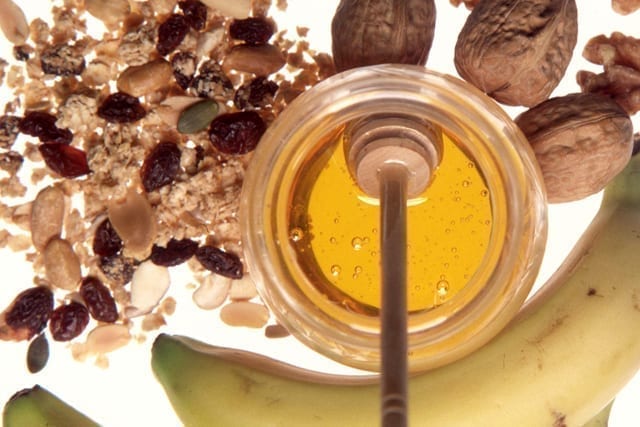You already know which edibles to avoid before bedtime—namely, alcohol, coffee and sugary desserts (all the good stuff!). But it might surprise you to learn that there actually are some foods that you can eat for a better slumber. You just need to know what nutrients to look for in the grocery aisles.“A lot of people know what not to eat—a heavy meal, spicy foods, caffeine,” says YouBeauty Sleep Expert, Shelby Freedman Harris, Psy.D. “But I have a lot of patients who snack all night or don’t eat at all before bed, both of which can disrupt sleep. They don’t know that a small snack is okay and which foods, besides turkey, contain tryptophan.”Tryptophan is that amino acid we all associate with going into a food coma during Thanksgiving dinner. It converts to serotonin and melatonin, the brain’s natural relaxation chemicals. Aside from turkey, it’s actually found in a slew of other foods, too. “Things like bananas, nuts, seeds, honey and eggs typically have more tryptophan in them,” explains Freedman.MORE: Five Natural Sleep AidsAnd that’s not the only nutrient to look for when trying to get more shut-eye.Complex carbohydrates are important too, notes YouBeauty Nutrition Advisor Kristin Kirkpatrick, R.D., because they also promote serotonin.“Most people choose carbs when they’re stressed because they want to feel good,” she says. “But that can mean some really unhealthy choices, like donuts, even though they increase serotonin. You get sugars and carbs and open up those feel-good hormones, only to be followed by a sugar crash.” That crash can cause us to wake up during the night.So instead, Kirkpatrick suggests opting for healthier carbs to boost those relaxation hormones—namely, whole grain foods such as whole wheat crackers, beans and whole grain pastas.Want the most bang for your buck? “If you mix the tryptophan foods with a healthy high-carb foods, that actually ensures the tryptophan will stay in your system longer,” explains Freedman.Of course, if you have chronic insomnia, loading your plate with these sleep-inducing foods won’t cure it. But if you have a little trouble settling down at night, adjusting your diet is worth a shot. Kirkpatrick says her “perfect sleep menu” includes a small portion of 100 percent whole grain pasta with turkey meatballs for dinner and a handful of nuts for a light snack before bed.QUIZ: Are You Getting Enough Beauty Sleep?Here are a few other sleep-promoting bedtime snacks you can nibble on an hour before you hit the hay:
- Banana and nuts. Have half of a banana with a handful of your favorite nuts. “You’re getting tryptophan and carbs,” says Freedman. “It’s a great mix.”
- Crackers and peanut butter. Get a few whole wheat crackers and spread on some all-natural peanut butter for a mix of complex carbs and protein with tryptophan.
- A bowl of cereal. The milk contains tryptophan and the whole-grain cereal adds the complementary complex carbs. Just be sure to ditch the Captain Crunch—avoiding sugar helps prevent a sleep-disruptive blood sugar crash during the night.
- Cheese stick. Munching on a low-fat cheese stick before bed supplies tryptophan. Plus, a lean protein can leave you calm and less frazzled while keeping your blood sugar on an even keel during the night, according to Kirkpatrick.
Just be sure to eat dinner at least three hours before bedtime and have a snooze-inducing snack about an hour before you climb under the sheets. You don’t want to go to bed full or completely hungry—both can disrupt your sleep. Instead, try to find a happy medium and you may just get a more blissful slumber.COLUMN: Always Sleeping In? Could Be a Sleep Disorder?




































